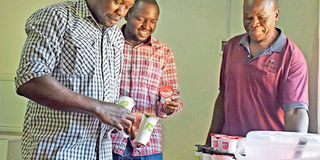Our yoghurt plant runs on milk from four cows

Gilbert Ochieng' with his two sons, Edgar Ochieng and Sospeter Onyango sample the yoghurt products they make in their enterprise in west Seme. They get the milk from only four Friesian cows. PHOTO | ELIZABETH OJINA | NMG
What you need to know:
- Besides good management of his animals, Ochieng makes yoghurt from the produce he gets that he sells in shops at the nearby township.
- After his retirement from Posta, the farmer relocated with his animals to his rural home in Seme and commercialised the dairy farm.
- They spray the animals every Saturday as part of the routine pest and disease control and deworm them after every three months.
- The highest milker offers 20 litres while the least 15 daily, with the farmer getting at least 60 litres each day. They sell the milk to households in the neighbourhood at Sh75 a litre
A dusty road off Kisumu-Usenge highway leads one to Osewre village in west Seme.
Our destination is at Gilbert Ochieng’s dairy farm, where he keeps four Friesian cows.
Well, four is the number of animals most small-scale farmers keep, but that is not what makes his farm tick.
Besides good management of his animals, Ochieng makes yoghurt from the produce he gets that he sells in shops at the nearby township.
“My shed has a capacity to house nine dairy cows but it is currently hosting four and I am working on increasing the number. Each of the animals has a mattress to make them comfortable,” says Ochieng.
The farmer, with the help of his two sons Edgar Ochieng and Sospeter Onyango, has been involved in dairy farming for the longest time.
“I started farming while living in Moi’s Bridge in Uasin Gishu County. I began with crosses of Zebu-Friesian and Zebu-Ayrshire, which I eventually sold and upgraded to pure Friesians,” says the former postmaster, who retired in 2006.
After his retirement from Posta, the farmer relocated with his animals to his rural home in Seme and commercialised the dairy farm.
“Kisumu has offered us better prospects because a litre of milk sells at a higher price than in Eldoret since few people keep dairy cows. Currently, a litre sells at Sh75 as compared to Eldoret’s Sh50. However, the challenge with Kisumu is that the price of dairy input is higher than in Eldoret,” says the farmer, who ploughed Sh300,000 capital in the business.
They spray the animals every Saturday as part of the routine pest and disease control and deworm them after every three months.
HIGHEST MILKER
The cows are fed on Boma Rhodes hay that goes at Sh250 a bale, brewer’s waste sourced from Kenya Breweries Ltd plant in Kisumu, dairy meal and plenty of water and mineral lick.
“We feed them before milking at 5:30am and after milking during the evening hours. Each cow consumes at least a bale of hay daily and all use 50kg sack of dairy meal in three days,” he says.

The agripreneurs feed their four dairy cattle in the farm. The cows are fed on Boma Rhodes hay that goes at Sh250 a bale, brewer’s waste sourced from Kenya Breweries Ltd plant in Kisumu, dairy meal and plenty of water and mineral lick. PHOTO | ELIZABETH OJINA | NMG
The highest milker offers 20 litres while the least 15 daily, with the farmer getting at least 60 litres each day. They sell the milk to households in the neighbourhood at Sh75 a litre
From the milk they get, they use 35 litres for making yoghurt, their latest venture after they bought a 100-litre pasteurising machine in Nairobi at Sh100,000, a freezer and a generator.
To make yoghurt, the produce is sieved and stabilisers and sugar added. The milk is then pasteurised at 85 degrees Celsius for 30 minutes and then cooled to 48 degrees Celsius and starter culture added.
“We incubate the milk for a minimum of six hours and then flavour it, either as strawberry or vanilla,” offers Ochieng.
“Most people make the product using milk, food colour and cultures, however, you can also add honey to make yoghurt nutritious,” he adds.
Their yoghurt, branded Sunbit, is packed in 150ml and 250ml plastic cans, chilled and sold at Sh30 and Sh50 respectively. “We have an established market in Bondo, Siaya, Kisumu, Akala and Aluor. We are in the process of obtaining standardisation mark to be able to sell our products in supermarkets,” says Onyango.
****
Nutritious product
Yoghurt is a nutritious milk product with a myriad of health benefits.
It helps in eliminating lactose intolerance (case where the digestive problem is unable to digest lactose), reduces susceptibility to stomach cancer and prevention of genital and urinary tract infections.
Yoghurt is further a good source of calcium.




